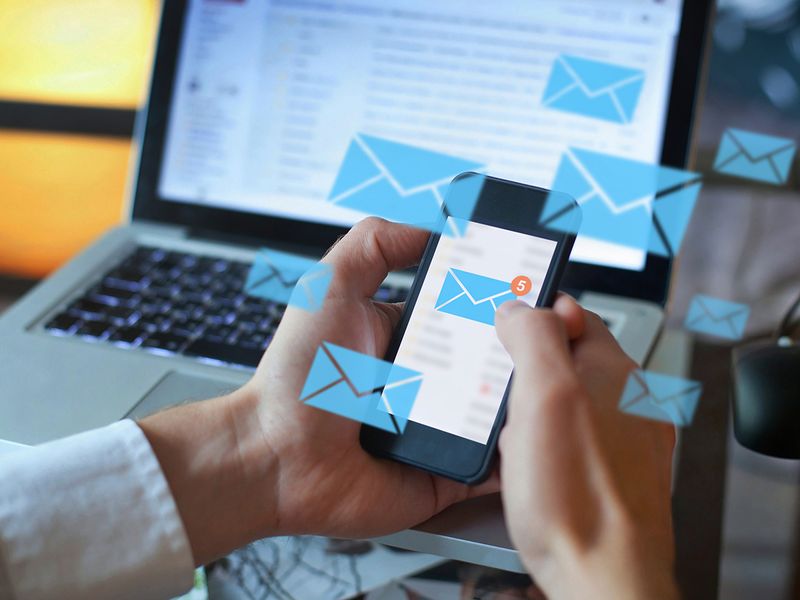
There’s nothing gentle about gentle reminders. And the email never finds you well.
Nothing annoys working professionals more than emails with vague flatteries, unnecessary niceties or even passive-aggressive follow ups. “As per my last email…” is a sure way for your email to be left on hold.
There are several ‘Dos and Don’t’s’ when writing a professional email. “Emails can be irritating. First of all, you can’t see the person. Often, you might not know the person. So, it’s already very hard to connect with someone you can’t see or don’t even know. So a lot depends on the tone of the email, and how they explain the context,” says Nick Smallman, a UK-based thought leader in culture, communication and engagement.
Remember, a working professional is already swamped with a million emails a day; a vague, generic, aggressive or meaningless one filled with false niceties will either elicit an angry, irritated response, or just be left unread. Or, possibly, sent to trash.

Emails can be irritating. A lot depends on the tone of the person in the email and how they explain the context. They need to be empathetic to connect with the other person. For example, they can start an email by saying I know you must be busy...
So how do you not irritate someone with a professional email? Well, here’s how.
Skip the dears, dearests and dearie
“No one’s so dear to you, you aren’t writing to your grandmother,” says Mai Lin, a Dubai-based manager at a marketing consultancy. “I’ve deleted emails from people who addressed me as dearest,” she says flatly. She has been called dearie too, much to her shock. “I’ve had to remind people to not address me like that,” she says.
So, avoid the over-familiarity. No one’s your lovely, dear or honey at work, as an irritated Lin reminds. “I can’t stand over-familiarity from people that I do not know,” says Melanie Paul (name changed on request), an American freelancing writer, based in Abu Dhabi. “I dislike it when strangers write emails addressing me as ‘lovely’. It’s like ‘Hey lovely, thought I will check in…’ and the email is followed by some irrelevant announcement,” she says. Be professional, friendly, but without going overboard.
Be specific in your subject line
For all you know, your recipient might be subjected to a flood of emails a day. They don’t have time to read each email. They’ll probably just look at the subject and see if it’s worth their time. If they don’t find it so, it usually remains unread or goes to trash. So keep the subject line short, explains Ritu Matthew, communications strategist Matthew. Get to the point.
Many people won’t have the patience to read an email with a blank subject or something vague or generic. “I wouldn’t read an email with the subject ‘just checking in’ or ‘greetings’. So keep your subject short; let it capture the essence of your email, like a headline," says Paul. Otherwise, you and your email are ignored.
The email never finds you well
Yes we know the emails that begin with this line: ‘Hope this email finds you well.’ “It does not sound sincere. The first thing that comes to mind when reading it is, ‘Okay, what do you want?”’ says Neil Sheth, founder of Writefully, which focuses on leadership content strategies. “It sounds rather clichéd, as if you really don’t care what’s happening with them, but you’re just determined to get your work done,” says Lauren Simmons, a Canadian Human Resources director from Dubai. Just say hello, and hope you're well.

Hope this finds you well does not sound sincere. The first thing that comes to mind when reading it is, ‘Okay, what do you want?
Skip the slang
Don’t wander and confuse the reader, advises Ritu Matthew, a Dubai-based Communications strategist. “You don’t have to begin with a chatty, over-friendly conversation before getting into the conversation, especially if you have emailed them several times a day,” she says. “Skip the slang, excessive punctuation and emoticons,” she says.
A little empathy doesn’t hurt
Emails can be a frustrating form of communication for various reasons, one being that you can’t see the person. “You need to show a little empathy in your emails, so that they can at least have a sense of your tone and mood,” explains Smallman. If you know they’re busy, you can use words like ‘I know you must be busy’… and give them clear context, of what you need. Keep it short, simple and basic, and that’s the best way to not annoy someone.
In this form of written communication, you need to establish some form of trust with the other person, he says.

You don’t have to begin with a chatty, over-friendly conversation before getting into the conversation, especially if you have emailed them several times a day. Skip the slang, excessive punctuation and emoticons
“Always think, how would I feel when reading this,” says Sheth.
‘Just following up’

There’s no point following up on a previous email, when the other person doesn’t remember what you’re following up on.
According to American self-help author Jocelyn Glei in her book, Unsubscribe: How to Kill Email Anxiety, Avoid Distractions, and Get Real Work Done, avoid sending a trite message like ‘just following up’.
Explain your request again, so that the person doesn’t have to sift through a long email thread and see what you’re referring to. As Glei writes, “If that person didn’t respond to your email the first time, resending the same message is probably not going to get better results the second time.”
Avoid being pushy and passive-aggressive: No gentle reminders
Don’t mark your emails with ‘URGENT’ (in upper case mind you), when you know, it isn’t urgent. Moreover, don’t do it just in the hope that you are capturing someone’s attention. “I’ve received emails from people saying, ‘Hey, I haven’t heard from you for a week, so I guess you’re not interested. Well, in case you are, let me know’,” recalls Tina Das, a former corporate communications from Abu Dhabi. “Such emails just trigger you into a rage, or you just delete them and never respond,” she says.
Also, avoid ‘gentle’ reminders. There’s no such thing as a gentle reminder, says Simmons. “Everyone knows that a reminder is a call to action. Adding gentle to it, just sounds more passive-aggressive and leaves the other person aggravated,” she says.
“In terms of tone of voice, always be warm and approachable – not cold, impersonal, and definitely not patronising or passive-aggressive,” says Matthew.
Think before you ‘cc’

“The point of cc’ing someone is that they’re kept in the loop. That person already has context. If they don’t, then don’t cc them. It’s simple. There’s no prize for the number of people you can stuff into an email. Put yourself in their shoes, how would you like being copied in an email that’s completely out of the blue? Exactly,” explains Sheth.
Don’t copy others on an email when there’s no need
Moreover, don’t email several people in the hope that they will forward it to the person who is supposed to receive the email. This is considering the scenario that the person hasn’t responded. In all probability, they will email the same person and filled their inbox with the same email, adds Simmons. Nothing annoys a person more.









